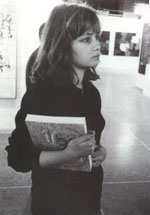Your Past is at Your Shoulder
| |
 Shena Mackay |
Over the years I've had a lot of obsessive relationships with authors. I think the first may have been William Golding, from when we read Lord Of The Flies in high school, and I went out and picked up The Pyramid, which remains one of my favourite books ever. I read other Golding novels at that time, but none seemed to resonate with the same energy, although maybe it was just my fourteen year old lack of attention that drove me off to other things, like riding bicycles and watching motor cars. Whatever. Next came J. D. Salinger, who again I read in high school. We had the coolest English teacher for two years, really inspiring, and she made us read The Catcher In The Rye, and boy am I glad she did. It's cliché to go on about it, but you know that book really is one of those artistic moments where something all comes together, a synthesis that connects timelessness with a very acute critique of a specific point in cultural and social history. Some people think that Salinger is over-rated, but of course they are wrong, and of course there was the Postcard obsession with Salinger too, with that imaginary Secret Goldfish single, and the Holden Caulfield International thing going on with Orange Juice. Then there was Jane Gardham. Gardham wrote some of the most peculiarly addictive fiction ever, or so it seemed to my sixteen year old mind, and I lost myself completely in Bilgewater, It's a Long Way To Verona, and God On The Rocks. Bilgewater especially is a classic of teenage unrequited loves and ought to be a compulsory text in schools the land over. After Gardham I slunk into Shena Mackay, courtesy of Kevin Pearce, who raved about her so much I had to take notice, because then, as now, when Kevin recommends something, you don't leave the stone unturned. Mackay wrote some of the greatest books ever. Her duo of Toddler On The Run and Dust Falls On Eugene Schlumburger was written when she was 17, or was it 16, and both are magically quirky Pop novellas that both reflect and belie her age. Best of all was Redhill Rococco, which Julie Burchill said she had read innumerable times, and if that puts you off, it shouldn't, because Redhill Rococco is one of those all too rare examples of a warmly, richly funny novel with a heart of a diamond. Mackay writes with the eye of a photographer like Martin Parr, capturing the odd details and telling remarkable stories about seemingly unremarkable people. In amongst all those obsessions there have been others of course, some obvious, some perhaps less so. Kerouac, Chandler, Hammett, Pelecanos, Block, Fante (John), Brautigan, Handler, Mosley all of whose books I have sought out with devout intent, and devoured with (mostly) immense pleasure. The most recent addition to the list is James Sallis. |
 James Sallis |
I've mentioned my admiration for Sallis' Lew Griffin series of books elsewhere of course. Published in the UK by the ace No Exit imprint, you'll find the Lew Griffin novels racked in the 'crime' or 'thriller' sections of your local book store or library, although really that's to tell, if not an untruth, certainly to not tell the whole story. For whilst the Lew Griffin novels occasionally include traditional crime elements such as murder, or more usually missing people, the books use these elements only as jumping off points, or as punctuation marks for a much larger story. The larger story is about life; is about the nature of life and our passage through our worlds in our existences, touching on people and events that in their own ways punctuate those lives, those movements. It's all largely philosophical, where the philosophers are those of the street, the poets living in the bars, the cafes, wherever there is warmth to be sought out, a buck or a drink to be hustled. Sallis uses the cast of characters that people the books as ciphers for expressing a variety of world views, as a means of exploring thought and of establishing moral and cultural viewpoints. It's all about books, and about writing too. I particularly love the character of Doo-Wop who trades drinks in bars for stories. He lives in, as Sallis puts it 'Hopi Mean Time', which is to say always in the present. To Doo-Wop there is no past and no future, only the present, which is an interesting counterpoint to the fact that throughout the entire Griffin series the books travel in a myriad of loops through time, moving back and forwards almost hypertextually. I really love this idea, because it reflects my own fiercely held opinion that all of our lives are spent treading and re-treading (in subtly altered ways) the same paths. Or at least that we loop and revisit previous moments in memory, which move us out onto new paths which ultimately, at some time, return again. And so on. The Freudians would have us believe that this point to which we return is death, or perhaps birth, but I don't think so. I think instead it's to do with a sense of loss; a sense of wanting to escape the loss, break free from its inestimable force. I think Sallis' books are about this too. There are so many great lines to quote from the Lew Griffin novels, but one of my favourite extracts is from Eye of the Cricket where Griffin/Sallis talks about the past: "The past is no insubstantial, thready thing, sunlight slanting through shutters into cold rooms, pools and standards of mist adrift at roadside, memories that flutter from our hands the instant we open them. Rather it is all too substantial, bluntly physical, like a boulder or cement block growing ever denser, ever larger, there behind us, displacing and pushing us forward." For me this is the root of the Lew Griffin stories; the idea that we are all out there/here, pursuing ourselves down the streets of our towns and over the hills and valleys of our countrysides, making as much of a sense of everything as we can. And that it's never easy. The Lew Griffin books are also largely about books, and about the nature of writing. Through these books Sallis is commenting on the very processes involved in writing, is critiquing narrative and structure. Which might sound academic and pretentious and dull, but Sallis is never dull, is never didactically academic and is never pretentious. Or if he is he instantly defuses it with a knowing nod and a wink, a word to the wise guy. The Lew Griffin series is now, with the publication of Ghost of a Flea, closed. Whilst that seems a shame, it's also both gratifyingly conclusive and at the same time unbelievable. Because for a series of books where traditional narrative structure is so playfully and creatively messed around with, not even death can be read as a definitive ending; there is always the belief that at some point Sallis will find himself revisited by Lew at some point in his future, to pull him around once more to a past that keep pursuing. And then again, with the Griffin novels supposedly 'complete', one wonders what new delights Sallis may have in store for us. I for one am waiting with trembling anticipation. |

|
Also awaited with some interest is a second published novel from Jason Flores-Williams, whose debut The Last Stand of Mr America has just been published in the UK by Canongate books. The cover hyperbole would have you believe the book is in 'the tradition of Jack Kerouac, Charles Bukowski and Biggie Smalls." Of course that's just publisher hype, and Flores-Williams is not in the league of those greats, at least not yet, as I'm sure (or rather hope) he himself would be first to accept. As first novels go, The Last Stand is good, if heardly earth-shattering. Flores-Williams has a background in Philosophy and marketing, and it shows in this novel, which is allegedly a novel that cuts to the core of modern American values, illuminating the heart of darkness that lies within. And whilst it does pretty much exactly what it says on the tin (or the book jacket at least), one cant help thinking 'oh right, ANOTHER critique of traditional American values', as if we don't already all know that the mythic Americana of apple pie and Good Christian Values is just that; mythic. That it never really existed like that in the first place, that the past is only the past that we are allowed to see by those who control the media. I think we kind of take it for granted now that beneath the happy family facades of a million '50s Cunningham families there was always desperation and depression, abuse and recluse. Pleasantville showed that so eloquently of course; pointed out the fact that the 'death of innocence' that America in particular likes to proclaim every couple of years is in fact itself a myth, that there is nothing inherently modern or contemporary in the fact that there is violence and hatred within our societies, just that such ideas are more out in the open now. So perhaps the real issue is one of repression, and whether the self-discipline of repression is a good and desirable thing, or not. Last Stand of Mr America begins to explore those questions, but not with enough rigour, and otherwise treads fairly predictable ground. There's what one might call fanatically 'pure' Christian values versus the 'sordid' world of transvestism and Sex clubs; there's vague philosophical questions about the nature of work and the upholding of personal integrity in the face of the unremitting demand to consume New product, to stay if not ahead of the pack, at least in line with it. There's the rather obvious questions about interventionism in the lives of others; when you are aware of abuse going on around you in someone else's personal life, what do you do? Walk away and forget it, or make a move? And when the value of individual 'freedom' is upheld over all else, is there really a choice to be made? Last Stand of Mr America asks all these questions, and gives answers to some of them to greater or lesser degrees of satisfaction. Like I said, it's a good first novel (apart from the horribly unnecessarily predictable ending), but the real interest is in what comes next. © Alistair Fitchett 2002 |